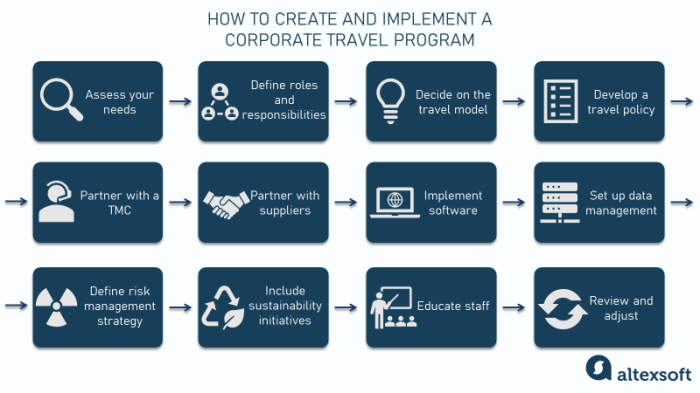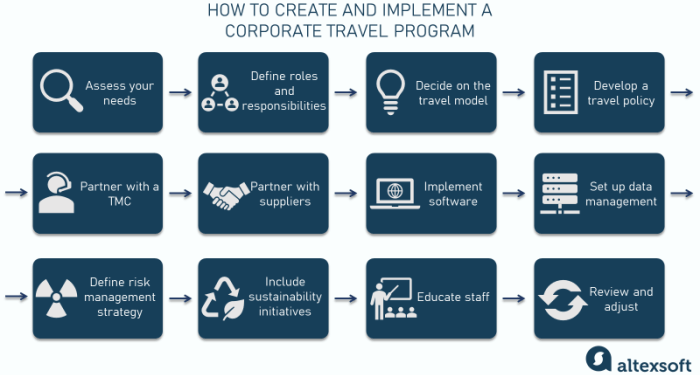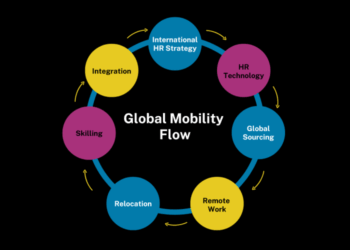Embark on a journey through the top 10 corporate travel programs that every business should be aware of. This comprehensive guide will shed light on the essential programs that can elevate your business travel experience.
Overview of Corporate Travel Programs

Corporate travel programs are structured policies and strategies implemented by businesses to manage and optimize their employees' travel activities for work-related purposes. These programs are essential for businesses of all sizes as they help streamline the travel process, control costs, and ensure the safety and well-being of employees on the road.Businesses should invest in corporate travel programs to effectively manage their travel expenses, negotiate better rates with travel suppliers, track employee travel activities, and provide duty of care to their employees.
By having a centralized system in place, companies can monitor travel expenses, ensure compliance with travel policies, and make informed decisions to improve overall travel efficiency.Some benefits that corporate travel programs offer to companies include cost savings through negotiated rates, improved visibility and control over travel expenses, enhanced employee satisfaction with streamlined booking processes, and increased duty of care by tracking employee whereabouts during travel.
Additionally, these programs can help companies analyze travel data to identify trends, optimize travel budgets, and enhance overall travel experiences for employees.
Top 10 Corporate Travel Programs
Corporate travel programs are essential for businesses looking to manage their travel expenses efficiently while providing convenience to employees. Here are the top 10 corporate travel programs that every business should know:
1. Concur
- Concur is a comprehensive travel management platform that allows businesses to book flights, hotels, and rental cars in one place.
- Key features include expense tracking, policy compliance, and real-time reporting for better visibility and control over travel spending.
- Concur offers pricing based on the number of users and transactions, providing flexibility for businesses of all sizes.
2. Expensify
- Expensify is known for its user-friendly interface and seamless integration with accounting software.
- With Expensify, employees can easily capture receipts, track expenses, and submit reports for reimbursement.
- Pricing for Expensify is based on active users, making it a cost-effective option for businesses looking to streamline their expense management processes.
3. TripActions
- TripActions offers a modern approach to corporate travel with personalized booking recommendations and 24/7 customer support.
- Key features include a loyalty program for travelers and a centralized platform for managing travel policies and expenses.
- While pricing for TripActions varies based on the services required, businesses can expect competitive rates and a high level of service.
4. Egencia
- Egencia is a corporate travel management solution that provides access to a global network of travel suppliers and negotiated rates.
- With Egencia, businesses can simplify the booking process and ensure compliance with travel policies.
- Pricing for Egencia is transparent and customizable, allowing businesses to tailor the program to their specific needs and budget.
5. Lola.com
- Lola.com is a user-friendly corporate travel platform that combines AI technology with human travel agents for a personalized booking experience.
- Key features include budget tracking, itinerary management, and 24/7 support for travelers.
- Pricing for Lola.com is subscription-based, offering businesses a predictable cost structure for their travel management needs.
6. TravelPerk
- TravelPerk is a cloud-based travel management platform that simplifies the booking process and provides insights to optimize travel spending.
- With TravelPerk, businesses can centralize their travel policies, expenses, and reporting for better control and visibility.
- Pricing for TravelPerk is transparent and based on a per-user, per-month model, making it a scalable solution for businesses of all sizes.
7. Certify
- Certify is an all-in-one travel and expense management platform that helps businesses streamline their processes and reduce costs.
- Key features include automated expense reporting, policy enforcement, and approval workflows for efficient expense management.
- Certify offers competitive pricing based on the number of users and transactions, making it a cost-effective choice for businesses looking to simplify their travel and expense processes.
8. TripIt
- TripIt is a popular travel organization app that allows travelers to create detailed itineraries, receive real-time alerts, and store travel documents in one place.
- Key features include flight tracking, calendar integration, and sharing options for seamless travel planning and coordination.
- While TripIt offers a free version with basic features, the pro version provides additional benefits such as real-time flight alerts and reward point tracking.
9. Upside
- Upside is a unique corporate travel platform that offers personalized packages combining flights, hotels, and rental cars at discounted rates.
- Key features include 24/7 customer support, price lock guarantees, and cash back rewards for travelers.
- Pricing for Upside is transparent, with bundled packages available at competitive rates to help businesses save on their travel expenses.
10. American Express Global Business Travel
- American Express Global Business Travel is a leading corporate travel management company that offers end-to-end solutions for businesses of all sizes.
- Key features include negotiated rates, travel policy compliance, and risk management services for a seamless travel experience.
- Pricing for American Express Global Business Travel is customized based on the services required, offering businesses flexibility and comprehensive support for their travel needs.
Travel Management Companies (TMCs)
Travel Management Companies (TMCs) play a crucial role in corporate travel programs by offering comprehensive solutions to manage all aspects of business travel. These companies specialize in providing services such as booking flights, accommodations, ground transportation, and other travel-related needs for corporate clients.TMCs help businesses streamline their travel processes by leveraging their expertise, technology, and industry connections.
They can negotiate discounted rates with airlines, hotels, and other travel suppliers, ensuring cost savings for their clients. Additionally, TMCs offer personalized travel support, 24/7 assistance, and detailed reporting and analytics to help businesses optimize their travel expenses and policies.
Popular TMCs and Their Services
- Amex GBT (American Express Global Business Travel): Amex GBT is a leading TMC that offers end-to-end travel management solutions, including online booking tools, expense management, and traveler safety services.
- BCD Travel: BCD Travel provides corporate travel services to businesses of all sizes, focusing on cost control, travel policy compliance, and traveler satisfaction.
- Carlson Wagonlit Travel (CWT): CWT is known for its innovative technology solutions, data-driven insights, and personalized service offerings to help businesses optimize their travel programs.
- Expedia Group: Expedia Group's corporate travel division offers a wide range of services, including booking tools, expense management, and traveler tracking, catering to the needs of small and medium-sized businesses.
Loyalty Programs and Rewards
When it comes to corporate travel, loyalty programs play a crucial role in ensuring both the company and the traveler benefit from the travel experience. These programs offer a range of rewards and incentives that can make business travel more cost-effective and enjoyable.
Importance of Loyalty Programs in Corporate Travel
- Loyalty programs help companies save money by offering discounts, upgrades, and other perks to frequent travelers.
- They encourage employee loyalty and satisfaction, leading to increased productivity and morale.
- For travelers, loyalty programs provide opportunities to earn points that can be redeemed for free flights, hotel stays, and other travel-related expenses.
Benefits of Loyalty Programs for Companies and Travelers
- Companies can track and manage travel expenses more effectively through loyalty programs, allowing for better budgeting and cost control.
- Travelers can enjoy personalized travel experiences, priority services, and exclusive benefits that enhance their overall travel journey.
Examples of Innovative Loyalty Programs
- Delta Air Lines' SkyMiles program offers multiple ways to earn and redeem miles, including through flights, credit card purchases, and partner activities.
- Marriott Bonvoy rewards members with points for every stay, which can be used for free nights, room upgrades, and other perks across their extensive hotel portfolio.
- Hertz Gold Plus Rewards allows frequent renters to skip the counter, choose their own car, and earn points towards free rental days with every booking.
Travel Policy Compliance
Travel policy compliance plays a crucial role in corporate travel programs as it ensures consistency, cost-effectiveness, and employee safety throughout the travel process
Significance of Travel Policy Compliance
- Reduces unnecessary expenses by enforcing guidelines on booking accommodations, transportation, and other travel-related expenses.
- Enhances employee safety by ensuring compliance with security protocols, travel restrictions, and emergency procedures.
- Streamlines the approval process by establishing clear guidelines for travel requests, budgets, and reimbursement procedures.
Challenges in Ensuring Compliance
- Resistance from employees who prefer personal preferences over company policies.
- Lack of awareness or understanding of travel policies due to inadequate communication or training.
- Difficulty in monitoring compliance in real-time, especially with last-minute changes or bookings.
Strategies to Improve and Enforce Compliance
- Regular training sessions and communication to educate employees about travel policies and the importance of compliance.
- Implement automated tools and systems for booking travel, tracking expenses, and enforcing policy guidelines.
- Establish consequences for non-compliance to motivate employees to adhere to the policies.
Duty of Care and Travel Risk Management
When it comes to corporate travel, duty of care refers to the legal and ethical responsibility that employers have to ensure the health, safety, and well-being of their employees while they are traveling for work purposes. This duty extends beyond the workplace and includes travel-related activities.
Role of Travel Risk Management
- Travel risk management involves identifying potential risks that employees may face during business trips and implementing measures to mitigate these risks.
- It includes providing employees with resources, information, and support to help them stay safe while traveling.
- Travel risk management also involves having a clear plan in place to respond to emergencies and crises that may arise during travel.
Best Practices for Implementing Duty of Care Measures
- Develop a comprehensive travel risk management policy that Artikels expectations, procedures, and resources for employees.
- Provide employees with pre-trip safety information, including destination-specific risks and emergency contacts.
- Use technology tools to track and communicate with employees during their travels, ensuring their safety and well-being.
- Have a 24/7 emergency response system in place to assist employees in case of emergencies.
Travel Expense Management
Effective travel expense management is crucial for businesses to control costs, ensure compliance with company policies, and optimize overall travel spend. By implementing efficient processes and utilizing the right tools, organizations can streamline expense reporting and reimbursement, resulting in improved financial visibility and accountability.
Tools and Technologies for Streamlining Expense Reporting
- Expense Management Software: Utilize automated platforms to capture, track, and report expenses in real-time, reducing manual errors and delays.
- Mobile Apps: Enable employees to submit expenses on-the-go, simplifying the process and accelerating reimbursement cycles.
- Integration with Corporate Travel Programs: Integrate expense management tools with travel booking systems to consolidate data and enhance visibility into travel expenses.
Tips for Optimizing Travel Expense Management Processes
- Establish Clear Expense Policies: Communicate clear guidelines on what expenses are reimbursable and the documentation required for each category.
- Enforce Pre-Approval Processes: Implement pre-trip approval workflows to control expenses before they are incurred, ensuring compliance with budget limits.
- Regular Audit and Analysis: Conduct regular audits of expense reports to identify trends, discrepancies, and opportunities for cost savings.
- Employee Training: Provide training on expense policies, tools, and best practices to ensure employees understand their responsibilities and the importance of accurate reporting.
Sustainable Travel Programs
In recent years, there has been a growing trend towards sustainable travel programs in the corporate world. Companies are increasingly recognizing the importance of adopting environmentally friendly practices in their business travel to reduce their carbon footprint and contribute to a more sustainable future.
Benefits of Sustainable Practices in Corporate Travel
- Reduced carbon emissions: By choosing more sustainable modes of transportation and accommodations, companies can help lower their overall carbon footprint.
- Cost savings: Sustainable travel practices can often lead to cost savings in the long run through reduced energy consumption and waste management.
- Enhanced corporate reputation: Companies that prioritize sustainability in their travel programs can improve their reputation among customers, employees, and stakeholders.
- Employee satisfaction: Employees are increasingly motivated to work for companies that demonstrate a commitment to environmental sustainability.
Examples of Companies with Successful Sustainable Travel Initiatives
| Company | Initiative |
|---|---|
| Microsoft | Implemented a carbon fee on business travel to offset emissions and invest in renewable energy projects. |
| Salesforce | Partnered with sustainable travel providers and encouraged employees to use public transportation or carpooling for business trips. |
| H&M | Offsetting carbon emissions from business travel by investing in reforestation projects and renewable energy sources. |
Corporate Travel Program Evaluation
Regularly evaluating corporate travel programs is essential to ensure efficiency, cost-effectiveness, and employee satisfaction. By assessing the effectiveness of travel programs, businesses can identify areas for improvement and make informed decisions to enhance overall travel management.
Key Performance Indicators (KPIs)
- Cost Savings: Measure the cost savings achieved through negotiated rates, travel policy compliance, and efficient booking processes.
- Traveler Satisfaction: Evaluate traveler feedback, on-time performance, and overall experience to gauge satisfaction levels.
- Compliance: Monitor adherence to travel policies and regulations to ensure consistency and control over travel expenses.
- Travel Program Utilization: Track the utilization of preferred suppliers, online booking tools, and loyalty programs to optimize benefits.
Conducting a Thorough Evaluation
- Collect Data: Gather relevant data on travel expenses, booking patterns, traveler feedback, and compliance levels.
- Analyze KPIs: Use the key performance indicators mentioned above to analyze the effectiveness of the travel program.
- Identify Trends: Look for trends or patterns in travel data to pinpoint areas that require improvement or optimization.
- Solicit Feedback: Seek input from travelers, travel managers, and stakeholders to gain insights into their experiences and suggestions for improvement.
- Implement Changes: Based on the evaluation findings, implement necessary changes to enhance the corporate travel program and achieve better results.
Future Trends in Corporate Travel
Corporate travel programs are constantly evolving to meet the changing needs of businesses and travelers alike. In this digital age, emerging trends and technologies are reshaping the landscape of corporate travel. Let's explore some of the key future trends that are influencing the industry and how businesses can adapt to stay ahead of the curve.
Impact of AI and Automation
AI and automation are revolutionizing corporate travel by streamlining processes, enhancing personalization, and improving efficiency. Chatbots, virtual assistants, and predictive analytics are being utilized to offer personalized recommendations, manage bookings, and provide real-time assistance to travelers. Automation also helps in expense management, policy compliance, and reporting, saving time and reducing errors.
Blockchain in Travel
Blockchain technology is gaining traction in the travel industry, offering enhanced security, transparency, and efficiency in transactions. Smart contracts powered by blockchain can automate processes like booking confirmations, payment settlements, and loyalty program rewards. This decentralized approach ensures data integrity, reduces fraud, and simplifies cross-border transactions, benefiting both businesses and travelers.
Sustainable Travel Initiatives
As sustainability becomes a top priority for businesses, corporate travel programs are focusing on eco-friendly practices and reducing carbon footprint. Companies are implementing green travel policies, promoting use of public transportation, encouraging virtual meetings, and offsetting carbon emissions from travel activities.
Sustainable travel not only aligns with corporate social responsibility goals but also improves brand reputation and employee satisfaction.
Personalization and Employee Experience
Personalization is key to enhancing employee experience and satisfaction during business travel. Companies are leveraging data analytics and AI to customize travel preferences, accommodation choices, and itinerary planning based on individual preferences. By offering tailored experiences, businesses can boost employee productivity, loyalty, and overall well-being, leading to higher retention rates and improved performance.
Contactless Travel Solutions
In the wake of the COVID-19 pandemic, contactless travel solutions have become essential for ensuring traveler safety and well-being. From touchless check-ins, digital boarding passes, to contactless payments, businesses are adopting technology-driven solutions to minimize physical contact and maintain hygiene standards.
Contactless travel not only reduces health risks but also enhances efficiency and convenience for travelers on the go.
Final Thoughts
In conclusion, staying informed about the top corporate travel programs is key to optimizing your business travel efficiency and cost-effectiveness. With the right programs in place, your company can soar to new heights in the realm of corporate travel.
FAQs
What are some key benefits of corporate travel programs?
Corporate travel programs offer cost savings, streamlined booking processes, access to exclusive perks, and enhanced traveler safety.
How can businesses improve travel policy compliance?
By clearly communicating policies, providing training, using travel management software, and regularly monitoring compliance.
What role do loyalty programs play in corporate travel?
Loyalty programs enhance traveler satisfaction, encourage repeat business, and can lead to cost savings for companies.













